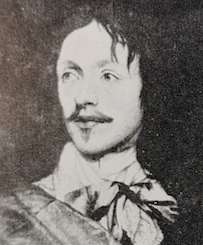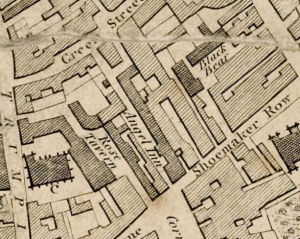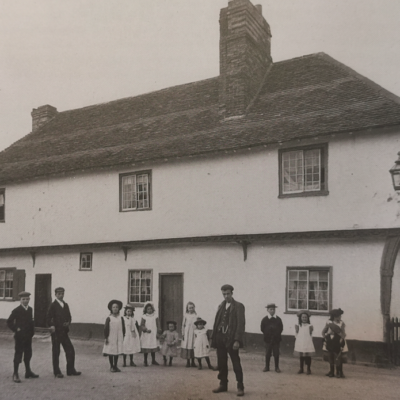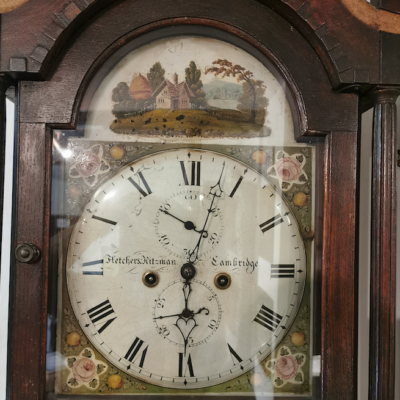Search by topic
- archaeology
- architecture
- bricklayer
- Building of Local Interest
- carpenter
- church
- crime
- dressmaker
- fire
- Great Eastern Railway
- listed building
- medieval
- oral history
- Public House
- Rattee & Kett
- Religious House
- Roman
- scholar
- school
- Then and Now
- tudor
- women
- work
- world war one
- world war two
Search by text
6 Rose Crescent, The Rose Inn / Tavern
History of 6 Rose Crescent
The Rose stood on the site of an earlier student’s hostel, St Paul’s Inn.
Cambridge Inscriptions Explained by Nancy Gregory 2006 p25 describes a memorial brass on the north wall of Great St Mary’s Church in honour of Michael Woolf, once landlord of the Rose Tavern and also churchwarden.
hic situs est Michael Woof, vir bonus et probus hospes
inter iucundus gloria prima senes.
innocuam vitam non livor non mala fama
laedere quidquam ausa est nil nisis mors potuit
obiit v martii, anno Dni 1614
posuit Bar. Woolf
Here lies Michael Woolf, a good man and an honest landlord
Among jolly old men he was a winner.
Neither envy nor malicious gossip dared to hurt him in the least;
Nothing but death could do that.
He died on March 5th 1614
Bartholomew Woolf set this memorial up.
See Enid Porter: Old Cambridge Inns
In 1654 a stagecoach service was started from the Swan Inn in Holborn to the Rose Inn, every Tuesday, Thursday and Saturday, carrying four passengers inside at 10s. each.
The Rose is mentioned by Samuel Pepys in his diaries. In October 1667 he visited the town on his way to his estate at Brampton:
Away to Cambridge, it being foul, rainy weather; and there did take up at the Rose, for the sake of Mrs Dorothy Drawwater, the vintener’s daughter, which is mentioned in the play of Sir Marton Mar-all …… [Next day] Up and got ready and eat our breakfast and then took coach …. so we away and got well to Cambridge about 7 to the Rose, the waters not being so high as before …. after dinner, away again and came to Cambridge, after much bad way, about 9 at night; and there at the Rose I met my [father’s] horses, with a man staying for me …..
1669 Samuel Newton’s Diary 1st May:
Saturday morning betweene 10 an 11 of the Clock came from Newmarket up the Peticury to the Rose Taverne in Cambridge the Prince of Tuscany in his Coach and 6 horses with a postilion, there came along with him 2 other Coaches, he was about the age of 28 years a proper man very think in person and very swarthy in his favour he came apparelled in the then english mode an ordinary stuffe vest and tunick ………
1670 Sir Thomas Chicheley of Wimpole was elected High Steward of Cambridge. Alderman Newton, in Diary, gave a description of the election. On 17th January:
Tewsday at a generall Common day adjourning from the Tewsday before to this day, was the Patent of Sir Thomas Chicheley sealed for his being High Steward of Cambridge. The same day came in and were sworne Freeman Captain Hunt and mr Turner at the Rose; .. they both together gave a Treat of wine at the Rose to the Mayor, Alderman and 24ty &.
1707
In Samuel Newton’s diary for 19th April it is recorded:
Saturday night about 10 or 11 at the Rose Taverne in Cambridge upon a quarrell betweene Alderman Thomas Fox junr. and Joseph Pyke concerning the Town Clarks place, the said Mr Fox with his penknife did stabb the said Joseph Pyke in his side near his belly; but he recovered of the wound.
1798
1817 The owner, John Home, was unable to meet his debts and the premises, including a ‘flourishing brewery’ were sold off.
The inn yard was converted into a street, ‘Waterloo Place’, and James P Twiss took ownership of the brewery.
1818 Twiss is advertising his beers at Water Place.
c. 1822 – 1823: Twiss moves brewery to Newmarket Road.
1861
William Press, 39, wine merchant, b Norfolk
1910 13th May
ROWDY BEHAVIOUR. Singing Ribald Songs on Sunday Evening. Before Mr. W. B. Redfern and other magistrates at the Borough Police Court on Friday, Thomas Manning, 8, Arthur-street, Chesterton, bricklayer, Harry George Miller, 87, Richmond Road, shoemaker, Horace Graveling, 75, Alpha Road, Chesterton. carpenter, Walter Molt, 6, Saxon-street, shoemaker, and Harry Graveling, 5, Ram-yard, bricklayer, were summoned for committing a disorderly act in Trinity-street on Sunday, May 1st.
Mr O. Papworth appeared for the defendants, all of whom pleaded not guilty.
P.S. Merry said that at 10.5 p.m. he was on duty in Bridge-street in company with P.C.s Robinson and Gregory. He heard several persons in Trinity-street singing a ribald song, set to a Salvation Army tune, at the top their voices. They came round the corner arm in arm shouting the song, and all five abreast in the middle of the street. They continued to sing until just before they reached witness and the constables, when they scattered, and all ran in different directions. He caught Miller and P.C. Robinson caught Manning. Both refused give their names and addresses until they had been taken a considerable distance towards the police station. consequence of what Manning told him, he saw Molt the following day at his place of business. He said, ‘I suppose you were expecting me?’ He said,’Yes, but I was not there, and don’t know anything about it’. H saw Harry Graveling later on Sunday night, and said that defendants were singing but were doing no harm. He added that they did not know what they were singing.
Mr Papworth: He would swear that all five of the men were singing. It was true that two of them came from the Ram-yard after the others were caught, but they had run towards the Ram-yard when they saw witness.
P.C. Robinson, who corroborated, said in cross-examination that he could not swear to all the men. He could hear the words they were singing.
P.C. Gregory said in cross-examination that he could swear to four of the men, and could hear quite distinctly the words they were singing.
P.C. Evans, of the County Police, said he was with P.S. Merry when he interviewed four of the men next day. They could not find Miller. Manning said that they were all together and were all as bad as one another. Molt denied that he was there, but Graveling and Manning both declared that he was. The only man who denied being there was Molt.
Mr. Papworth then called the defendants.
Molt said that he did not come up St. John’s street with the other defendants, and did not sing with them. He was standing at the top of St. John’s-street with Harry Graveling and another man.
By the Chief Constable: He could not get the other man, whose name was Carson, to come up and give evidence.
Mr Campkin: He would swear that neither he nor Harry Graveling sang at all.
Harry Graveling gave similar evidence, stating that he and Molt left the Rose Hotel at twenty minutes to ten and went from there to the Merry Boys, leaving there at ten. Horace Graveling said that he and Manning and Miller had not been singing when the police stopped them. The other two defendants were not with them. Later he said that he was not singing, but he could hear someone singing. He could no, however, swear who it was.
By the Chief Constable: He did tell the police that Molt was with them, but that was wrong.
Miller said they only whistled the tune. Thev would admit that they whistled it. Someone behind was singing it. He could swear that Harry Graveling did not come up the street with them, and he did not see Molt all that day.
Manning corroborated. When they heard the song they thought they would like to ‘chime in with a whistle.’
By the Chief Constable: He had a headache that night, but he had not had too much to drink, and it was not true that the landlady at the Rose refused to serve him.
Mr. Papworth asked the Bench say that there w;as not sufficient evidence on the part of the police to convict the men. There was not particle of evidence of identification of two or three of them, and it was impossible for the police to tell at a distance just who was singing.
The Bench deliberated in private, and afterwards the Chairman announced that they had decided to dismiss the case against Harry Graveling and Molt, for they thought the case in regard to them was doubtful. The other three defendants would be fined 10s. each, including costs. It was a grave offence against the general public to sing such ribald songs, on a Sunday evening at all times.
5/5/1911: The landlady of the Rose public house, Rose Crescent was fined for allowing gambling. Detective Marsh said he went into a room at the back of the bar and saw a young man put money in a penny-in- the-slot machine. He pulled a lever and a ball was forced round. If it had got into a red compartment it paid out two pence but it fell into a white compartment and the money was lost. There was another machine of a different make in the bar. Police had received definite instructions to prosecute in all cases where the machines were found. But there was a similar machine at the Mitre, where it was allowed. (Cam.News)
1913 The Rose
Mrs Eliza Best
Contribute
Do you have any information about the people or places in this article? If so, then please let us know using the Contact page or by emailing capturingcambridge@
License
This work is licensed under CC BY-NC-SA 4.0












